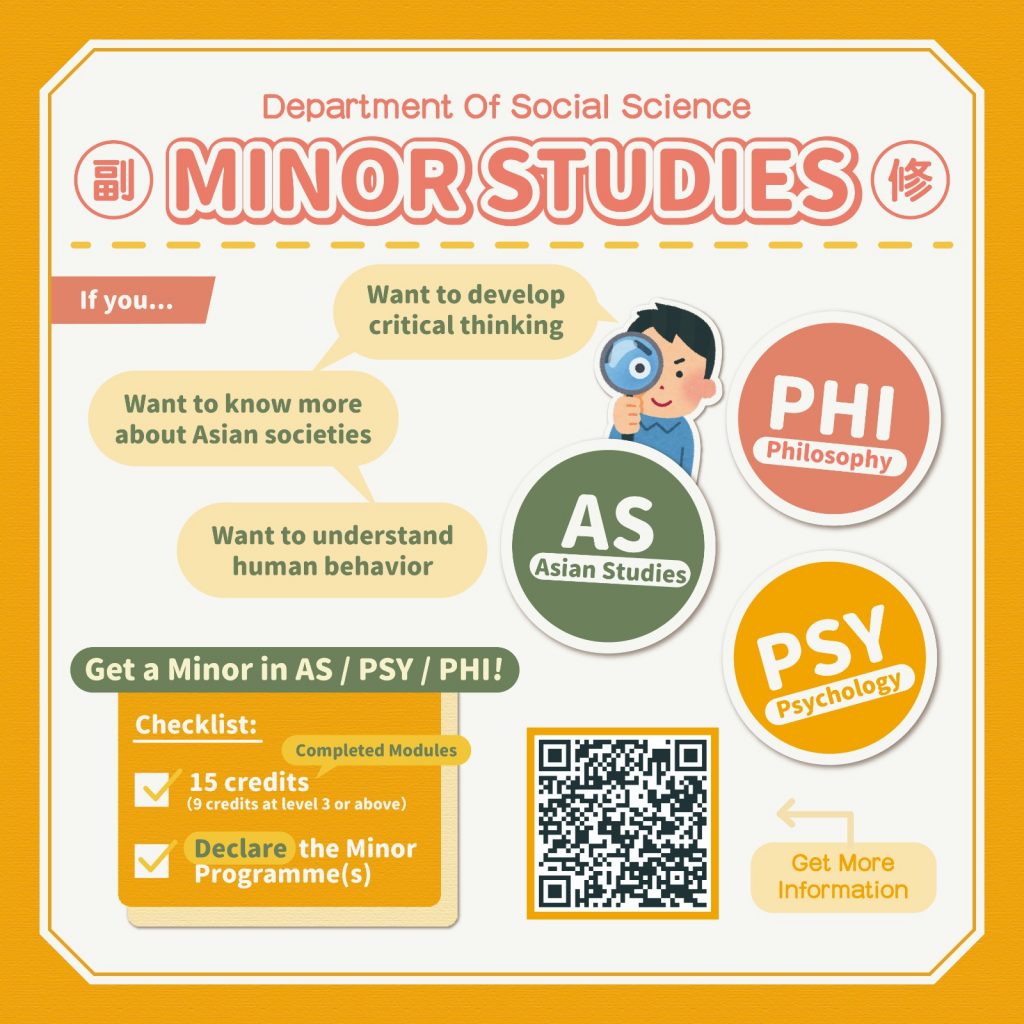Undergraduate Major Programmes
Bachelor
BA (Hons) in Psychology
The Bachelor of Arts (Honours) in Psychology (BA-PSY) Programme adopts the unique ‘Liberal + Professional’ education model to equip students with comprehensive foundational knowledge and skills in psychology. ‘Liberal’ means that the Programme adopts a broad-based and cross-disciplinary approach to connect knowledge domains, facilitate thinking, and solve problems. ‘Professional’ means that while the Programme is broad-based and cross-disciplinary, it also has professional orientation elements which aim at equipping students with the competencies to enter into relevant professions in the future.
A distinctive feature of the Programme is that, in addition to covering and integrating all major areas in psychology and their cognate disciplines, it provides three specialisations, Education and Clinical, Business and Technology, and Neuroscience and Health. These specialisations not only develop students’ interests and capacities in psychological applications, but also enhance their employability and readiness for further professional training.
BSocsc (Hons) in Asian Studies
The 21st century is an Asian century. The economic miracles of Asia in recent years have brought about significant changes that have attained world recognition. The Bachelor of Social Sciences (Honours) in Asian Studies programme aims to give students a solid understanding of Asia’s transformation and its associated complexities by adopting a multidisciplinary approach. Students will have the opportunity to examine Asia’s metamorphosis from social, political, economic, cultural, and historical perspectives. This approach will help cultivate students’ critical thinking and communication skills. Besides allowing students to comprehend the miracles of Asia, the programme also helps students to appreciate and respect cultural diversity at the same time.
BSocsc (Hons) in Philosophy, Politics and Economics
The Bachelor of Social Sciences (Honours) in Philosophy, Politics, and Economics adopts a “Bridge Model” that emphasises the interconnection among philosophy, politics, and economics. While training in philosophy nurtures students with critical and analytical reasoning and a humanistic concern about social and economic problems, training in politics and economics provides them with an important conceptual and up-to-date awareness that helps them understand and evaluate what happens worldwide. Based on these foundational concepts and knowledge, students will acquire comprehensive and flexible visions by taking several interdisciplinary modules that address how a public problem can be understood, analysed, and solved from these three perspectives. We believe that the bridge model can equip students with open-mindedness and a comprehensive vision for better coping with the ever-changing 21st century.
Postgraduate Programmes
Master
MSOCSC IN PUBLIC POLICY AND RISK GOVERNANCE
The Master of Social Sciences in Public Policy and Risk Governance Programme is the first of its kind in Hong Kong focusing specifically on a risk perspective in policy studies. It aims to cultivate students who are interested in public administration, risk governance and policy research-related work. In this ever-changing society, the analysis, assessment, and management of risks have become an indispensable part in public policy formulation. The government and the public sector need to be more forward-looking and take appropriate risk analysis in the decision-making process, and at the same time to actively involve the private sector and the larger public so as to create the room for policy changes. Graduates will be equipped with the ability to grasp the importance of risk factors in the policymaking process to propose innovative solutions.
Undergraduate Minor Programmes

The Bachelor of Social Sciences (Honours) in Philosophy, Politics, and Economics adopts a “Bridge Model” that emphasises the interconnection among philosophy, politics, and economics. While training in philosophy nurtures students with critical and analytical reasoning and a humanistic concern about social and economic problems, training in politics and economics provides them with an important conceptual and up-to-date awareness that helps them understand and evaluate what happens worldwide. Based on these foundational concepts and knowledge, students will acquire comprehensive and flexible visions by taking several interdisciplinary modules that address how a public problem can be understood, analysed, and solved from these three perspectives. We believe that the bridge model can equip students with open-mindedness and a comprehensive vision for better coping with the ever-changing 21st century.
The Common Core Programme
To better achieve the goal of our “Liberal + Professional” education model of HSUHK, Common Core Curriculum (CCC) aims to provide our undergraduate students a comprehensive educational experience throughout their 4-year university life. The curriculum consists of 3 elements:
1) General Education,
2) Chinese and English Languages and
3) Quantitative Methods and IT Skills.
It in one way targets at consolidating students’ intellectual and practical skills, in the other way cultivates students’ abilities in logical thinking, aesthetic appreciation and critical thinking, and enriches their knowledge beyond their major field of studies.
